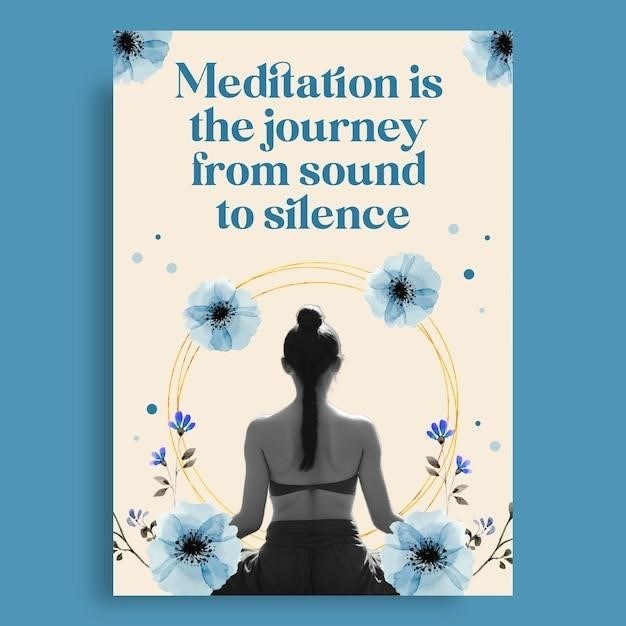El Poder de Estar Solo⁚ A Comprehensive Overview
Discover the transformative power of solitude‚ a crucial element for self-discovery and personal growth. Many online resources highlight its importance for improved decision-making‚ enhanced self-awareness‚ and stronger mental well-being. Learning to embrace solitude unlocks inner peace and resilience.
Understanding the Fear of Solitude
The fear of solitude‚ or autophobia‚ is a prevalent anxiety stemming from a deep-seated discomfort with being alone. Many individuals equate solitude with loneliness‚ interpreting it as isolation and a lack of connection. This misconception often fuels a relentless pursuit of external validation and constant companionship‚ hindering self-reflection and personal growth. Online discussions reveal that this fear is often rooted in childhood experiences‚ insecurities‚ and societal pressures that prioritize external validation over introspection. Overcoming this fear requires recognizing the difference between solitude and loneliness‚ understanding that solitude is a choice‚ not a punishment‚ and actively cultivating comfort in one’s own company. This involves engaging in self-soothing activities and developing a strong sense of self-reliance.
The Importance of Self-Sufficiency Before Relationships
Numerous online resources emphasize the critical role of self-sufficiency in building healthy relationships. Before seeking companionship‚ cultivating a strong sense of self-reliance is paramount. This involves achieving emotional independence‚ meaning you are content and fulfilled in your own company. Self-sufficiency also includes financial stability and the ability to meet your own needs without constant reliance on others. A person who lacks self-sufficiency often seeks validation and fulfillment from external sources‚ creating codependency and unhealthy relationship dynamics. By prioritizing personal growth and self-discovery before entering a relationship‚ individuals build a solid foundation of self-esteem and emotional maturity‚ leading to more balanced and fulfilling connections. This allows for a more authentic and reciprocal partnership‚ where both individuals contribute equally and maintain their individual identities.
Overcoming Anxiety and Building Confidence in Solitude
Many find the prospect of solitude daunting‚ evoking anxiety and fear; Online discussions reveal that overcoming this requires gradual desensitization. Start with short periods of alone time‚ engaging in activities you enjoy. This could be reading‚ pursuing hobbies‚ or simply relaxing in quiet contemplation. Gradually increase the duration of these solitary sessions as your comfort level grows. Mindfulness and meditation techniques can be invaluable tools for managing anxiety. These practices help to center your thoughts and reduce feelings of overwhelm. Building self-confidence in solitude involves acknowledging and validating your feelings. Recognize that it’s okay to feel anxious; the key is to approach these feelings with self-compassion rather than judgment. Celebrate small victories‚ such as successfully completing a solo activity or enjoying a peaceful moment of quiet reflection. This positive reinforcement helps cultivate a more positive association with solitude.
Practical Applications of Solitude
Harness the power of solitude for enhanced self-reflection‚ improved decision-making‚ and boosted creativity. Many online resources emphasize its role in fostering personal growth and inner peace.
Improving Self-Awareness and Introspection
Solitude provides a sanctuary for deep introspection‚ allowing you to disconnect from external distractions and reconnect with your inner self. Without the noise of daily life and social interactions‚ you can delve into your thoughts and feelings‚ fostering a deeper understanding of your motivations‚ values‚ and beliefs. This process of self-examination allows you to identify patterns of behavior‚ underlying emotions‚ and limiting beliefs that may be hindering your personal growth. By spending time alone‚ you create space for self-compassion and acceptance‚ leading to a more authentic and fulfilling life. Online resources often emphasize the importance of this mindful self-reflection in achieving a stronger sense of self. The ability to quiet the mind and listen to your inner voice is a critical skill for personal growth and emotional intelligence‚ often overlooked in our busy lives. Embrace the power of solitude to cultivate self-awareness and embark on a journey of profound self-discovery.
Enhancing Decision-Making and Meditation Practices
Solitude offers a unique opportunity to cultivate clarity and improve decision-making skills. Free from external pressures and distractions‚ you can engage in thoughtful contemplation‚ weighing the pros and cons of various options without the influence of others’ opinions. This process allows for a more objective and rational assessment‚ leading to more informed and effective choices. Furthermore‚ solitude creates an ideal environment for meditation and mindfulness practices. The quiet stillness allows you to focus on your breath‚ observe your thoughts without judgment‚ and cultivate a sense of inner peace. Regular meditation enhances self-awareness‚ reduces stress‚ and improves emotional regulation‚ all of which contribute to better decision-making. Many online resources emphasize the synergistic relationship between solitude‚ meditation‚ and improved cognitive function. By incorporating regular periods of solitude into your routine‚ you can enhance your ability to make sound judgments and cultivate a more centered and peaceful state of mind.
Boosting Creativity and Productivity Through Alone Time
Numerous online sources suggest that solitude significantly boosts creativity and productivity. When free from interruptions and social demands‚ the mind is allowed to wander and explore new ideas without the constraints of external pressures. This period of quiet contemplation allows for deeper concentration and focus‚ leading to more innovative solutions and creative breakthroughs. The ability to fully immerse oneself in a task without distractions is crucial for effective work. Solitude reduces multitasking and mental clutter‚ enhancing the efficiency and quality of one’s output. Moreover‚ the absence of external stimulation allows for better self-reflection‚ leading to a more profound understanding of one’s work and goals. This process can spark fresh perspectives and new approaches to problem-solving‚ resulting in heightened creativity and improved productivity. The ability to harness the power of solitude is a valuable asset for anyone seeking to enhance their creative output and achieve greater efficiency in their work.

Benefits of Embracing Solitude
Numerous online resources emphasize solitude’s profound impact on mental and emotional well-being. It fosters self-acceptance‚ inner peace‚ and resilience. Embrace solitude to cultivate a stronger‚ more balanced sense of self.
Strengthening Mental and Emotional Well-being
The power of solitude extends to a significant enhancement of mental and emotional well-being. Online discussions and articles frequently highlight how dedicated time alone allows for introspection and self-reflection‚ crucial for processing emotions and identifying personal stressors. This process can lead to a deeper understanding of oneself‚ fostering self-compassion and reducing the impact of daily anxieties. The ability to regulate emotions improves significantly‚ enhancing overall mental stability and emotional resilience. By disconnecting from external demands and embracing moments of quiet contemplation‚ individuals can cultivate a sense of calm and inner peace‚ vital for navigating the complexities of modern life. This intentional solitude acts as a buffer against the overwhelming pressures of daily life‚ promoting a healthier balance between external engagement and internal restoration. The reduced mental clutter that results from dedicated alone time often translates into improved mood regulation‚ reduced stress levels‚ and increased feelings of self-worth. The benefits are particularly noticeable in managing conditions such as anxiety and depression‚ where self-reflection and emotional processing are key components of effective therapy. Consequently‚ embracing solitude is a powerful tool for nurturing and strengthening both mental and emotional health.
Cultivating Inner Peace and Self-Acceptance
Numerous online resources emphasize solitude’s role in fostering inner peace and self-acceptance. Time spent alone‚ free from external distractions and social pressures‚ provides a fertile ground for self-reflection and the cultivation of self-compassion. By engaging in introspection‚ individuals can identify and challenge negative self-talk‚ fostering a more positive and accepting self-image. This process often involves confronting personal insecurities and limitations‚ leading to a greater sense of self-awareness and understanding. The quiet solitude allows for a deeper connection with one’s inner self‚ nurturing self-acceptance and promoting a more positive outlook on life. This inner peace translates into increased emotional resilience‚ allowing individuals to better cope with stressful situations and challenges. The absence of external demands and comparisons promotes a sense of contentment and self-sufficiency‚ independent of external validation. This self-acceptance is a cornerstone of genuine happiness and inner harmony‚ fostering a more fulfilling and meaningful life. By embracing solitude intentionally‚ individuals can create a sanctuary for personal growth and self-discovery‚ ultimately cultivating a profound sense of inner peace and self-acceptance.
Developing Resilience and Coping Mechanisms
The power of solitude in building resilience and effective coping mechanisms is frequently highlighted in online discussions about personal growth. Spending time alone allows for introspection and self-awareness‚ crucial in identifying personal strengths and weaknesses. This self-understanding forms the bedrock of resilience‚ enabling individuals to navigate life’s inevitable challenges with greater fortitude. During solitary moments‚ individuals can process difficult emotions and experiences without external pressures or distractions. This mindful processing fosters emotional regulation‚ a key component of effective coping. Solitude provides a safe space to experiment with different coping strategies‚ such as mindfulness exercises‚ journaling‚ or creative pursuits. The opportunity for unhurried self-reflection helps individuals develop a deeper understanding of their emotional responses and triggers‚ empowering them to develop personalized and effective strategies for managing stress and adversity. This self-directed exploration leads to a more adaptable and resilient mindset‚ better equipped to overcome obstacles and bounce back from setbacks. By cultivating a strong sense of self and mastering emotional regulation techniques through solitude‚ individuals cultivate resilience as a vital life skill.

Finding Balance⁚ Solitude and Connection
Integrating solitude into a busy life enhances relationships and personal growth. The key is finding a healthy balance between alone time and meaningful connections‚ fostering self-awareness and enriching interactions with others.
Integrating Solitude into a Busy Lifestyle
Incorporating solitude into a hectic schedule might seem challenging‚ but it’s achievable with mindful planning and creative strategies; Start small; dedicate even just 15 minutes daily to quiet reflection – a morning meditation‚ a lunch break away from screens‚ or an evening walk without distractions. This dedicated time for introspection allows for mental rejuvenation and stress reduction. Experiment with different techniques to discover what resonates best. Perhaps scheduling “technology-free” hours will create space for self-reflection. Consider incorporating short mindfulness exercises throughout the day to bring moments of calm into your busy routine. Remember‚ the goal isn’t to isolate yourself completely but to intentionally carve out pockets of solitude amidst the demands of daily life. This mindful approach helps cultivate a sense of peace and balance‚ ultimately enhancing your overall well-being and productivity. The key is consistency; even short‚ regular periods of solitude yield significant benefits.
Maintaining Healthy Relationships While Valuing Alone Time
Balancing personal time with meaningful relationships requires open communication and mutual understanding. Clearly expressing your need for solitude to your loved ones is crucial; explain that alone time is not a rejection of them‚ but rather a way to recharge and return to the relationship refreshed and more present. Schedule regular individual time‚ even if it’s just a quiet evening to read or pursue a hobby. This demonstrates self-care and strengthens the relationship by fostering independent growth. Encourage your partner or friends to do the same; healthy relationships thrive on mutual respect for individual needs. Instead of viewing alone time as isolation‚ frame it as a means of strengthening your bonds. Shared activities can still be enjoyed‚ but incorporating individual pursuits allows for personal growth and reduces feelings of being overwhelmed or drained. Open communication about individual needs will foster a stronger‚ more fulfilling relationship.
The Power of Solitude in Personal Growth
Solitude acts as a catalyst for profound personal growth. By disconnecting from external distractions‚ individuals gain clarity and insight into their thoughts‚ feelings‚ and motivations. This introspection fosters self-awareness‚ allowing for a deeper understanding of one’s strengths‚ weaknesses‚ and values. Alone time provides a safe space for self-reflection and critical examination of life choices and patterns. It is during this introspection that individuals can identify areas needing improvement‚ set realistic goals‚ and develop effective strategies for personal development. The ability to be comfortable in one’s own company cultivates self-reliance and resilience. This independence translates into stronger relationships‚ as individuals are less reliant on others for validation or emotional support. Embracing solitude empowers individuals to take ownership of their lives and pursue personal goals without external pressures‚ fostering a sense of autonomy and fulfillment. The journey of self-discovery through solitude is a powerful engine for personal transformation and lasting growth;
